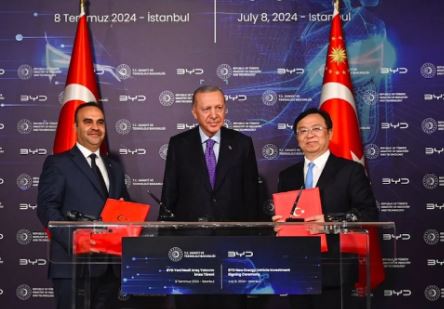Turkistan Times, July 19 - Istanbul: The fate of the promise made two years ago by Chinese automotive giant BYD to build a factory in Turkey with a one-billion-dollar investment has reignited intense public debate, following shocking claims from the YouTube channel "Hızlışarj" (Fast Charge). The video revealed that not even the foundation has been laid for the promised factory in Manisa, which was slated to produce 150,000 vehicles annually, establish an advanced technology R&D center, and directly employ 5,000 people. Furthermore, it was emphasized that BYD's true intention was not to make Turkey a production base, but to exploit it as a "profit machine."
Promises Left on Paper
BYD had announced that the factory in Manisa would usher Turkey into a new era of automotive manufacturing and be a giant step towards technological independence. Although government officials and some media outlets promoted this investment as an "economic victory," two years after the promise (as of July 17, 2025), no foundation-laying ceremony has been held, no construction machinery has been put to work, and no official report on the matter has been released at the designated site. Local residents have also expressed their disappointment, stating, "They gave us a promise, but so far, there has been no concrete action."
Massive Economic Incentives and a Profit-Driven Strategy
The core of the criticism focuses on the large-scale economic incentives granted to BYD. These measures, published in Turkey's "Official Gazette," include customs duty exemption, free land allocation, income tax exemption, government coverage of social security premiums, significant corporate tax reductions, a value-added tax (VAT) exemption, low-interest loans, and energy subsidies. According to the video, these incentives, rather than encouraging factory construction, paved the way for BYD to achieve immediate profits. The implementation of the customs duty exemption even without the factory being built, allowing for the tax-free import of cars, reveals that BYD views Turkey not as a production base, but as an "exploitation ground" to maximize its profits.
An Astonishing Price Difference
BYD's sales strategy and pricing in Turkey are presented as clear evidence of its opportunistic behavior. Taking the imported Atto 3 model as an example, the car's selling price in China is approximately 950,000 Turkish Lira, yet it is sold for 2,870,000 Lira in the Turkish market. Before the new tax regulation that took effect on July 1, 2025, when the Special Consumption Tax (ÖTV) rate was 10%, the car was sold for 1,925,000 Lira. Its price soared even higher after the tax rate was increased to 40%. However, the company had already raised the price of this model three times even before the tax hike. According to experts, it is impossible to explain this huge price gap with technological superiority or rising costs; it is a direct result of BYD's market strategy aimed at maximizing its profit margin.
Technology and After-Sales Service Concerns
The technical features of the cars BYD has launched have also faced criticism. Although its "Blade" battery technology offers advantages such as a lower risk of fire and a longer lifespan, issues like the lack of a local center in Turkey for over-the-air updates of its Android-based software, making all updates dependent on China, are causing concern among consumers.
The future of expanding the sales and service network without a factory is also uncertain. If the investment promise is canceled, there is a risk that spare parts supply and software support will become entirely dependent on China, leading to potential weeks-long waits for consumers in case of malfunctions, and a significant drop in the cars' second-hand market value.
The International Situation and a Look to the Future
It is well-known that China is a global leader in the electric vehicle industry, and BYD is a technology giant in this field. However, the European Union's plan to impose an additional 38.1% tariff on Chinese electric vehicles may have altered BYD's strategy. On the other hand, China's recent complaint to the World Trade Organization, arguing that these tariffs create unfair competition, has further complicated the issue. Some analysts view this complaint as a "distraction tactic" to conceal profit-seeking strategies, similar to the one in Turkey.
In conclusion, whether BYD's promise in Turkey materializes and the company's actions in the market will serve as a crucial signal for Turkey's future automotive strategy and its international investment climate.

